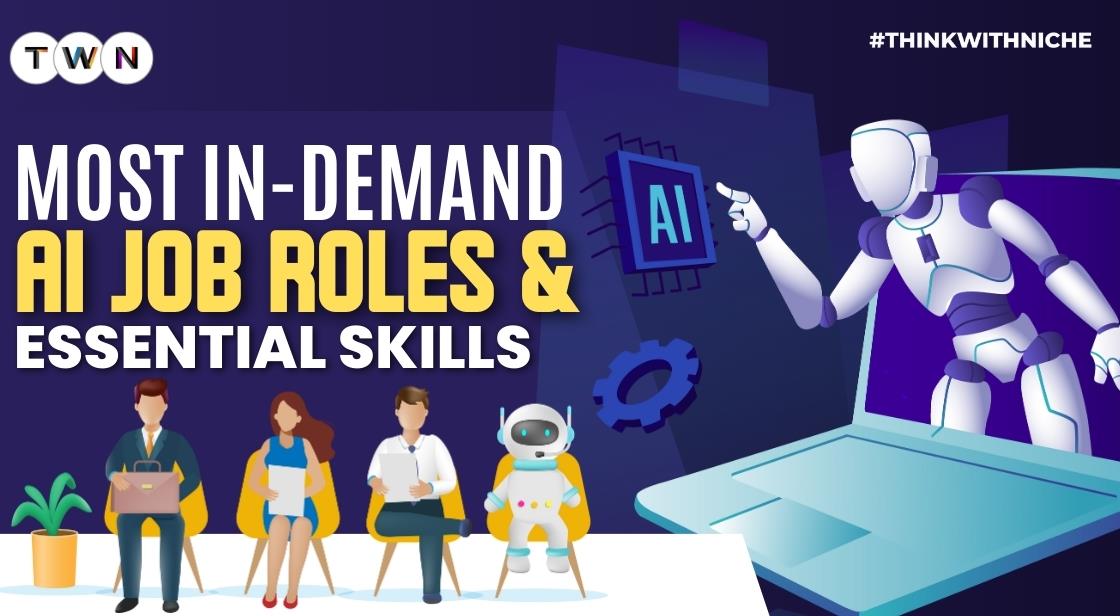Most In-Demand AI Job Roles and Essential Skills

Blog Post
As we venture into 2024, the field of artificial intelligence (AI) continues to expand, driving innovation across various industries. With AI's rapid growth, the demand for skilled professionals in this domain is at an all-time high. AI is transforming sectors such as healthcare, finance, automotive, and entertainment by enhancing efficiency, accuracy, and capabilities.
This surge in AI integration necessitates a workforce proficient in designing, implementing, and maintaining advanced AI systems. Consequently, numerous career opportunities are emerging, each requiring specialized skills and expertise to meet the evolving technological landscape.
From designing sophisticated machine learning models to ensuring ethical AI deployment, a wide array of AI careers is emerging, each requiring unique skill sets and expertise. AI/ML Engineers, for instance, are at the forefront of creating intelligent systems capable of performing tasks that traditionally require human intelligence, such as image and speech recognition.
On the other hand, AI Research Scientists are pushing the boundaries of what AI can achieve by developing new algorithms and methodologies. Meanwhile, roles such as AI Quality Assurance Engineers ensure the reliability and performance of these systems, and AI Ethics Officers are critical in maintaining ethical standards in AI deployment.
This blog explores the top AI careers for 2024, detailing the roles, responsibilities, and skills necessary to succeed in each position. Whether you are an AI/ML Engineer, AI Research Scientist, or AI Quality Assurance Engineer, understanding the nuances of these roles will provide valuable insights into how you can thrive in the AI landscape.
By examining the responsibilities and required skills for these positions, aspiring professionals can better prepare themselves for a successful career in AI.
Join us as we delve into the essential AI career paths and the competencies required to excel, paving the way for a future shaped by groundbreaking AI technologies.
We will highlight the educational background, technical skills, and industry experience needed for each role, offering a comprehensive guide for those looking to advance their careers in AI.
Embracing these opportunities will not only enhance personal career growth but also contribute significantly to the development and application of AI, driving innovation and progress across the globe.
Top AI Careers and the Skills You Need to Succeed in 2024
1. AI/ML Engineer: Driving Innovation in Machine Learning
About The Role AI/ML Engineers are pivotal in designing and developing artificial intelligence and machine learning systems that can analyze and learn from vast datasets. Their expertise lies in creating intelligent systems capable of tasks requiring human-like intelligence, such as image and speech recognition, and natural language processing.
Roles and Responsibilities of AI/ML Engineers
-
Design and Develop AI/ML Models: Architects of machine learning models and algorithms tailored to specific applications.
-
Implementation and Testing: Hands-on implementation and rigorous testing of AI/ML systems to ensure functionality and reliability.
-
Data Pipeline Development: Collaboration with data scientists to build robust data pipelines and preprocessing techniques essential for model training.
-
Integration with Software Applications: Working closely with software engineers to seamlessly integrate AI/ML functionalities into larger software applications.
-
Performance Optimization: Optimization of AI/ML models for enhanced performance, scalability, and efficiency.
-
Continuous Learning and Application: Staying abreast of the latest advancements in AI/ML research and applying cutting-edge techniques to solve practical challenges.
Skills and Qualifications of AI/ML Engineers
-
Educational Background: Preferably holds a Master’s degree in AI/ML or a related field.
-
Programming Proficiency: Strong coding skills in languages like Python, Java, or C++.
-
Expertise in ML Frameworks: Proficiency in TensorFlow, PyTorch, or Scikit-Learn for developing and deploying ML models.
-
Analytical Acumen: Strong analytical and problem-solving capabilities crucial for tackling complex AI/ML problems.
Salary of AI/ML Engineers
In the United States, AI/ML Engineers command an estimated annual salary of approximately $184,544, with an average yearly income of $128,512.
These professionals play a pivotal role in shaping the future of technology through innovative applications of artificial intelligence and machine learning.
2. AI Research Scientist: Exploring the Frontier of Artificial Intelligence
About The Role of AI Research Scientist
An AI Research Scientist plays a pivotal role in advancing artificial intelligence through cutting-edge research. They focus on developing new algorithms and methodologies to tackle complex challenges in fields like natural language processing, computer vision, and reinforcement learning.
Roles and Responsibilities of AI Research Scientist
-
Conduct original research in AI/ML, contributing to top-tier conferences and journals.
-
Develop and implement innovative AI/ML algorithms and models to solve real-world problems.
-
Collaborate with fellow researchers to identify new research areas and propose projects.
-
Design and execute experiments to evaluate the performance and applicability of AI/ML models.
-
Analyze data rigorously to derive insights and improve AI/ML models.
Skills and Qualifications of AI Research Scientist
-
Possession of a PhD or Master’s degree in computer science, artificial intelligence, or a related field.
-
Strong foundation in mathematics, statistics, and computer science principles.
-
Proficiency in programming languages such as Python, C++, or Java.
-
Hands-on experience with machine learning, deep learning, and reinforcement learning techniques.
-
Exceptional analytical thinking and problem-solving abilities.
Salary of AI Research Scientist
In the United States, AI Research Scientists earn an average annual salary of approximately $173,105, with salaries typically ranging around $117,539 annually.
These professionals are instrumental in pushing the boundaries of AI capabilities, driving innovation, and shaping the future of technology with their research contributions.
3. AI Architect
An AI Architect plays a pivotal role in designing and implementing AI solutions that align with organizational goals and technical requirements. They are responsible for crafting the architecture and infrastructure necessary for AI systems, providing crucial technical leadership throughout the development lifecycle.
Roles and Responsibilities of AI Architect
-
Designing AI Architectures: Developing robust AI architectures tailored to specific business applications, ensuring they are scalable and efficient.
-
Business Needs Alignment: Collaborating closely with stakeholders to comprehend business requirements and devising AI solutions that fulfill these needs effectively.
-
Data Pipeline Development: Creating and optimizing data pipelines and preprocessing techniques crucial for feeding AI systems with quality data.
-
Integration with Larger Applications: Working alongside software engineers to seamlessly integrate AI systems into broader software applications.
-
Performance Optimization: Constantly refining AI systems to enhance performance metrics such as speed and scalability.
-
Keeping Abreast of AI Advances: Staying updated with the latest advancements in AI research and incorporating relevant innovations into practical applications.
Skills and Qualifications of AI Architect
-
Software Development Expertise: Extensive experience in software development and adeptness in designing complex architectures.
-
AI Technology Proficiency: Deep knowledge of machine learning, deep learning, and other AI technologies, with a demonstrated ability to apply them effectively.
-
Cloud Platform Proficiency: Proficiency in cloud platforms such as AWS, Azure, or Google Cloud, essential for deploying scalable AI solutions.
-
Communication and Leadership: Strong communication skills to collaborate effectively with diverse teams and leadership qualities to guide AI initiatives.
Salary of AI Architect
In the United States, an AI Architect commands an average salary of $130,957 annually, with top earners reaching up to $192,067 annually based on experience and location.
4. AI Quality Assurance (QA) Engineer
About The Role An AI Quality Assurance Engineer plays a critical role in ensuring the reliability and performance of AI systems. They are responsible for conducting rigorous testing and validation processes to guarantee that AI models and algorithms meet specified requirements for accuracy and functionality.
Roles and Responsibilities of AI Quality Assurance Engineer
-
Develop Test Strategies: Create comprehensive test strategies and plans specifically tailored for AI systems. This includes strategies for data validation, model evaluation, and performance testing.
-
Execute Tests: Implement and execute test cases to evaluate AI systems thoroughly. Analyze test results meticulously to identify defects, vulnerabilities, and areas for enhancement.
-
Collaborate with Developers: Work closely with AI developers, data scientists, and stakeholders to understand system requirements and design appropriate test scenarios.
-
Automation: Automate testing processes wherever feasible to enhance efficiency, scalability, and reliability of testing procedures.
-
Documentation and Communication: Document test findings, issues, and recommendations effectively. Communicate findings with stakeholders to ensure timely resolution of identified problems.
Skills and Qualifications of AI Quality Assurance Engineer
-
Software Quality Assurance: Solid experience in software quality assurance and testing methodologies.
-
Machine Learning Knowledge: Familiarity with fundamental machine learning concepts, techniques, and algorithms.
-
Programming Skills: Proficiency in scripting languages such as Python or Shell scripting for developing and executing test scripts.
-
Problem-Solving Abilities: Strong analytical, problem-solving, and troubleshooting skills to diagnose complex issues effectively.
Salary of AI Quality Assurance Engineers
In the United States typically earn an average yearly salary of around $91,000, which is competitive and reflects the demand and specialized nature of their role in ensuring AI system integrity and performance.
Also Read: Top 10 Transitions for Professional Growth: 2024 Career Guide
5. AI Product Manager: Guiding AI Product Development
About The Role of AI Product Manager
An AI Product Manager plays a pivotal role in overseeing the entire lifecycle of AI products and solutions, from initial concept through to market launch. They are responsible for aligning product development with strategic goals, ensuring that AI technologies meet user needs and business objectives.
Roles and Responsibilities of AI Product Manager
-
Product Vision and Roadmap: Defining a clear vision for AI products and outlining a strategic roadmap to achieve business objectives.
-
Stakeholder Collaboration: Working closely with stakeholders to gather requirements, understand market needs, and prioritize features based on business value and customer feedback.
-
Cross-functional Leadership: Collaborating with engineering, design, and data science teams to ensure seamless product development and delivery.
-
Performance Monitoring: Monitoring product performance metrics and user feedback to continuously improve product features and functionalities.
Skills and Qualifications of AI Product Manager
-
Project Management: Ability to effectively manage multiple projects, prioritize tasks, and meet deadlines in a dynamic environment.
-
Product Management Experience: Previous experience in product management, particularly within the AI or technology sector, with a strong track record of successfully launching and managing products.
-
Technical Acumen: Solid understanding of AI technologies, machine learning concepts, and their practical applications.
-
Communication Skills: Strong interpersonal skills with the ability to communicate effectively across teams and stakeholders to drive consensus and align on product goals.
Salary of AI Product Manager
According to industry data, AI Product Managers in the United States can expect an estimated annual compensation of $244,511, with an average yearly salary of $151,551, reflecting the high demand and specialized nature of the role in the tech industry.
6. Data Scientist: About The Role
A Data Scientist specializes in analyzing complex datasets to extract valuable insights and build predictive models. Their primary responsibilities include collecting, cleaning, and preprocessing data to ensure accuracy and reliability.
Through exploratory data analysis, Data Scientists identify patterns, trends, and correlations that inform strategic business decisions. They play a crucial role in developing machine learning models using tools like scikit-learn, TensorFlow, or PyTorch to solve business challenges and make accurate predictions.
Roles and Responsibilities of Data Scientist
Data Scientists clean and preprocess data to maintain data integrity. They conduct exploratory data analysis to uncover meaningful insights and trends. Developing machine learning models is central to their role, allowing them to solve complex business problems and enhance decision-making processes.
Effective communication of findings through reports and visualizations is essential for influencing stakeholders. Additionally, Data Scientists collaborate with diverse teams to integrate data-driven solutions into products and services, ensuring alignment with organizational goals.
Skills and Qualifications of Data Scientist
Proficiency in programming languages such as Python, R, or SQL is essential for Data Scientists. They require a strong foundation in statistics and data analysis techniques to derive meaningful insights.
Experience with machine learning libraries and data visualization tools like Matplotlib, Seaborn, or Tableau is advantageous. Typically, Data Scientists hold a Bachelor’s or Master’s degree in statistics, mathematics, computer science, or a related field, providing them with the necessary academic background to excel in this dynamic role.
Salary and Job Outlook
Data Scientists in the United States earn an estimated annual compensation of $156,655, with an average yearly salary of $112,247. The profession is experiencing rapid growth, with a projected 35% increase in employment from 2022 to 2032, highlighting strong demand and career opportunities in the field.
7. AI/ML Ethics Officer: Ensuring Ethical AI Development and Deployment
An AI/ML Ethics Officer plays a crucial role in ensuring that artificial intelligence (AI) systems are developed and deployed in an ethical manner, free from bias and with consideration for societal impacts. This role encompasses several key responsibilities and requires specific skills and qualifications.
Roles and Responsibilities of AI/ML Ethics Officer
-
Developing Ethical Guidelines: Formulate and implement ethical guidelines that govern the development and deployment of AI systems, addressing issues of fairness, accountability, transparency, and privacy.
-
Conducting Audits and Assessments: Regularly audit AI systems to assess their ethical implications, identifying potential biases or ethical concerns that may arise during development or deployment phases.
-
Collaborating with Legal and Compliance Teams: Work closely with legal and compliance experts to ensure that AI systems comply with relevant regulations, standards, and organizational policies.
-
Educating Stakeholders: Educate various stakeholders, including developers, decision-makers, and end-users, on ethical considerations and best practices in AI technology use.
-
Addressing Ethical Concerns: Investigate and address ethical concerns raised by stakeholders regarding AI technologies, ensuring that issues are resolved promptly and responsibly.
Skills and Qualifications of AI/ML Ethics Officer
-
Ethical Expertise: A strong understanding of ethics, bias, fairness, and societal implications related to AI technologies.
-
Technical Knowledge: Familiarity with AI technologies and their applications, understanding the technical aspects to assess ethical impacts.
-
Critical Thinking and Decision-Making: Ability to navigate complex ethical issues, analyze situations, and make informed decisions that uphold ethical standards.
-
Educational Background: Typically holds a Bachelor’s or Master’s degree in ethics, philosophy, computer science, or a related field, providing the foundational knowledge necessary for the role.
Salary Insights of AI/ML Ethics Officer
In the United States, AI/ML Ethics Officers command competitive salaries, with the average around $122,000 USD annually. Salaries can range from $59,900 USD at the lower end to $191,000 USD at the higher end, reflecting the demand for professionals who can ensure ethical AI practices in organizations.
8. Natural Language Processing (NLP) Engineer
A Natural Language Processing Engineer specializes in developing algorithms and models designed to comprehend and process human language. This role is pivotal in creating applications such as text classification, sentiment analysis, and machine translation, essential for developing chatbots, voice assistants, and other language-driven technologies.
Roles and Responsibilities of Natural Language Processing Engineer
-
Developing NLP Algorithms: Create and implement algorithms and models tailored for various NLP applications.
-
Text Data Preprocessing: Handle text data preprocessing and analysis to extract meaningful insights.
-
Machine Learning Model Building: Build and train machine learning models for tasks including Text Classification, Named Entity Recognition, and Sentiment Analysis.
-
Model Evaluation and Optimization: Evaluate and optimize model performance using metrics like accuracy, precision, and recall.
-
Staying Updated: Keep abreast of the latest research and advancements in NLP technologies to incorporate cutting-edge techniques into projects.
Skills and Qualifications of Natural Language Processing Engineer
-
Programming Proficiency: Strong skills in Python, Java, or C++ are essential.
-
NLP Knowledge: Deep understanding of natural language processing algorithms and techniques.
-
Familiarity with NLP Libraries: Experience with libraries and frameworks such as NLTK, spaCy, or Transformers is crucial.
Salary of Natural Language Processing Engineer
In the United States, NLP Engineers can expect an estimated annual compensation of $156,411, with an average yearly salary of $121,483, reflecting the high demand and specialized skill set required for the role.
9. Computer Vision Engineer
Computer Vision Engineers specialize in designing and developing artificial intelligence systems that analyze and interpret visual data from images and videos. They play a crucial role in creating applications like facial recognition, object detection, and image classification systems.
Responsibilities of a Computer Vision Engineer
-
Algorithm Development: Designing and implementing computer vision algorithms tailored for specific applications.
-
Data Processing: Preprocessing and analyzing visual data obtained from cameras and sensors to extract meaningful information.
-
Model Training and Optimization: Training machine learning models, particularly deep learning models like CNNs and GANs, to perform tasks such as image classification and object detection. Optimizing these models for accuracy and efficiency.
-
Performance Evaluation: Assessing model performance using metrics such as precision, recall, and F1 score to ensure they meet desired criteria.
-
Collaboration and Integration: Working closely with cross-functional teams to integrate computer vision capabilities into products and services effectively.
Skills and Qualifications Required
-
Programming Proficiency: Strong skills in programming languages like Python, C++, or MATLAB, essential for algorithm development and implementation.
-
Understanding of Computer Vision: Deep knowledge of computer vision algorithms and techniques, including object detection, image segmentation, and feature extraction.
-
Experience with Tools and Frameworks: Familiarity with computer vision libraries and frameworks such as OpenCV, TensorFlow, PyTorch, or scikit-image for practical implementation.
-
Deep Learning Expertise: Knowledge of deep learning architectures like CNNs, RNNs, and GANs, crucial for developing advanced computer vision models.
Salary Insights
The average annual salary for a Computer Vision Engineer in the United States is approximately $119,327, with total pay estimates averaging around $164,038 per year. These professionals command competitive compensation due to their specialized skills and high demand in the AI and tech industries.
10. AI Trainer/Annotation Specialist
An AI Trainer/Annotation Specialist plays a pivotal role in the development of AI models by preparing and labeling datasets essential for training. Their primary responsibility lies in annotating diverse data types including images, videos, and text with accurate labels and metadata. This meticulous process ensures that machine learning algorithms receive high-quality data for effective training and performance.
Roles and Responsibilities of AI Trainer/Annotation Specialist
-
Dataset Creation: Responsible for creating training datasets by annotating data with labels, bounding boxes, and relevant metadata.
-
Quality Assurance: Ensures the accuracy and quality of annotated data through rigorous review and validation processes.
-
Collaboration: Works closely with data scientists and machine learning engineers to understand data requirements and annotation guidelines, ensuring alignment with project objectives.
-
Tool Development: Develops and maintains annotation tools and workflows to streamline the data labeling process, enhancing efficiency and accuracy.
-
Continuous Improvement: Stays updated with annotation best practices and tools, leveraging insights to improve annotation processes and data quality.
Skills and Qualifications of AI Trainer/Annotation Specialist
-
Attention to Detail: Essential for maintaining high levels of accuracy in annotation tasks.
-
Annotation Tools: Proficiency in tools like LabelImg, LabelMe, and VGG Image Annotator to ensure effective data labeling.
-
ML Understanding: Familiarity with machine learning algorithms such as supervised learning, classification, regression, and neural networks, facilitating informed annotation decisions.
Salary Insights of AI Trainer/Annotation Specialist
The anticipated annual compensation for an AI Trainer/Annotation Specialist in the United States is approximately $89,216, with an average yearly salary of $71,155. These professionals are crucial in bridging the gap between raw data and AI model training, contributing significantly to the advancement of artificial intelligence technologies.
You May Like
EDITOR’S CHOICE












